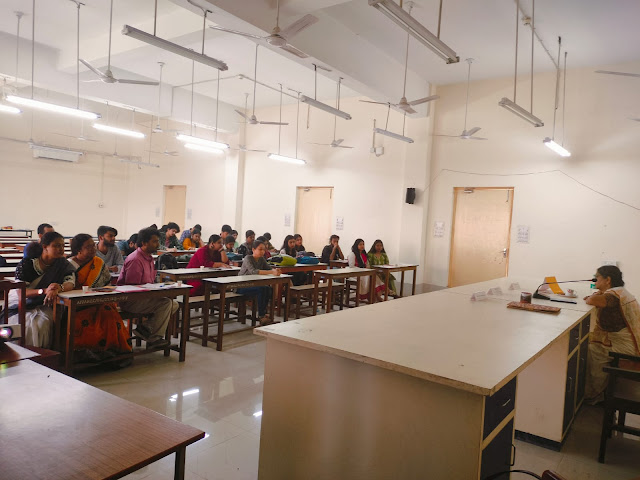National Seminar "In an Uncertain World: Anthropology and Anthropologists
Department of Anthropology, on 27.02.2024
The Department of Anthropology in Collaboration with IQAC of the college has organised a one-day National Seminar on "In an Uncertain World: Anthropology and Anthropologists" at Dr APJ. Abdul Kalam Government College. The main speaker was Prof. Subhadra Mitra Channa, Retired Professor, Department of Anthropology, Delhi University.
The concept note is as follows:
In and Uncertain World: Anthropology and
Anthropologists
One of the major aspects of the disciplinary
self-reflexivity of anthropology is that it often stops, reflects back,
criticises and progresses. Anthropologists often note an existence of
disciplinary crisis and strive for the future. We can think of the death and
revival of urban anthropology with spatial turn or publication of “Writing Culture: The Poetics and Politics of
Ethnography” by James
Clifford and George E. Marcus as one of such moments. IT and AI revolutions,
2020 global pandemic and increasing restless post-cold war world systems have
created another moment of such self-reflection.
Like every discipline, anthropology embraces a few
essential themes which include a perennial mistrust towards the generalisations
and the questions of positions. Theoretically speaking, anthropologists need to
relook at three key aspects of the discipline, viz. scepticism, empathy (or at
least openness), and holism. It is the scepticism towards the totalizing and
grand generalizations, especially the taken-for-granted and/or dominant regimes
that often defines what anthropology does in practice. It calls for a relook at
the subtleties of everyday life that escapes most of the a priori deductive
theoretical schemes and methods such as an option-based questionnaire. Such scepticism in part results in care for
the ignored and marginalised people’s point of view through empathy and finally
the recognition that world is an inter-connected hole. We look for the possibilities
of an amalgamation of the three to provide options to beat or at least blow the
establishment, so as to make anthropology work as a weapon to give voice to the
powerless. In consequence it can become a counterexample to the expansions of
the natural sciences. As one looks at the contemporary world one begins to
understand that there are immense possibilities to use this amalgamation to
address the contemporary issues and work for the future world.
Keeping the
disciplinary understanding of people’s everyday life in its changing terrain,
perhaps the best way to describe the contemporary world is to consider it as uncertain
and liquid. Services, industries, jobs and everyday security concerns have
become increasingly uncertain, transboundary and liquid. Human beings in
todays’ world are adapting to an increasing uncertainty simultaneously in both
the positive and negative senses. We have witnessed several revolutionary
changes in telecommunication and Information Technology and of late in the
virtual world with introduction of ever more powerful Artificial Intelligence
tools. The certainty with which people little more than one decade ago went to
sleep include their earning patterns, their life course and choices and the
future of their family and friends. The traditional concept of family,
neighbourhood, friendship and kinship relations were also more or less certain.
Today, one is uncertain even about his/her tomorrow. A person schooling at
Kolkata might just go to Singapore to study his/her +2 and end up joining a MNC
with global posting and remain restless for the rest of his/her life. While
just his friend might end up doing nothing dreadfully dependent on state’s aids
to survive. Co-evolving with economic and spatial uncertainty, our
relationships, leisure, politics and identity all are undergoing massive
alterations. Can we, the anthropologists equipped enough to study human beings
in an uncertain world? Can we the anthropologists adapt and change according to
the fast changing landscape of uncertainty? The seminar, is a preliminary
preparation to embrace this uncertainty which is going to be the characteristic
of our time.
Professor Channa mapped the issues of uncertainty by situating it in four major domains:
1. the question of marginal population who are living in an uncertain world for centuries now. Which in a way questions the urban and well off section of the population which finds uncertainty in recent time because of compulsory mobility of their time.
2. The question of focusing on post cold war world orders where people have become concerned for the fate of Ukrainians, or for that matter Gaza, but she questions the fact that we cannot really forget people in Africa, or for that matter the whole continents which were subjected to colonial expansions which resulted in killing of millions.
3. The issues of everyday marginalisation of people which is continuing even today.
4. Finally she argued for the disciplinary issues of anthropology.
Following are a few moments of the preparation by our students for the seminar also of the seminar venue.


.jpeg)


.jpeg)

.jpeg)
.jpeg)
.jpeg)
.jpeg)
.jpeg)
.jpeg)
.jpeg)
.jpeg)





.jpeg)




Comments
Post a Comment